
IN THIS ISSUE
MTASA SUMMER CONFERENCE
EXCERPT FROM HISTORY OF THE MUSIC TEACHERS’ OF SA INC
MTASA ANNUAL GENERAL MEETING Published





MTASA SUMMER CONFERENCE
EXCERPT FROM HISTORY OF THE MUSIC TEACHERS’ OF SA INC
MTASA ANNUAL GENERAL MEETING Published



Dear MTASA Members,
I am thrilled to extend a warm welcome to each and every one of you as we embrace the vibrant energy of the Autumn season in our MTASA Autumn 2024 edition.
First and foremost, let’s reflect on the success of our recent Summer Conference 2024, held on January 18 and 19 at the prestigious Prince Alfred College. The event was a true testament to our community’s dedication to musical excellence. We were treated to an array of delicious and generous catering that added a delightful touch to the event. The real highlight, however, was the inspiration drawn from the talks and presentations by esteemed speakers, including Rae de Lisle from NZ, Daphne Proietto from Victoria, Antony Hubmayer, and Thomas Saunders to name a few! We extend our heartfelt gratitude to our major sponsor SAMii, as well as all our generous sponsors, for making this event possible.
Looking ahead, I am thrilled to announce our exciting collaboration with AMEB at the imminent Concert Performance Day on Sunday 7 April at Elder Hall, University of Adelaide. This is an incredible opportunity for our members to showcase the talent of their students in a distinguished setting. Stay tuned for more details, as we will be sharing information through email and our social media channels.
Additionally, mark your calendars for an upcoming event at Government House exclusively for our members. More details will be coming your way soon, so be sure to check your emails and follow us on social media for the latest updates.
Speaking of social media, I encourage each of you to connect with us on Facebook and Instagram. Our platforms are buzzing with the latest news, events, and highlights from our community. Follow us to stay updated and engaged with the vibrant MTASA community.
As we move forward into this exciting season, let’s continue to celebrate the richness of our musical community. Your dedication and passion are the driving forces behind our success, and I am truly honoured to be a part of this remarkable association.
Wishing you all a harmonious and joyful Autumn!
Warm regards,
 Sofie Arhontoulis President, MTASA
Sofie Arhontoulis President, MTASA
PATRONS : Her Excellency the Honourable Frances Adamson AC, Governor of South Australia, Mr Rod Bunten, Dr Doreen Bridges AM, Emeritus Professor and David Lockett AM
PRESIDENT : Sofie Arhontoulis
VICE-PRESIDENT : Rodney Smith, Wendy Heiligenberg
SECRETARY : Michael Thompson
TREASURER : Samantha Penny
AUDITOR : Australian Independent Audit Services
COUNCIL
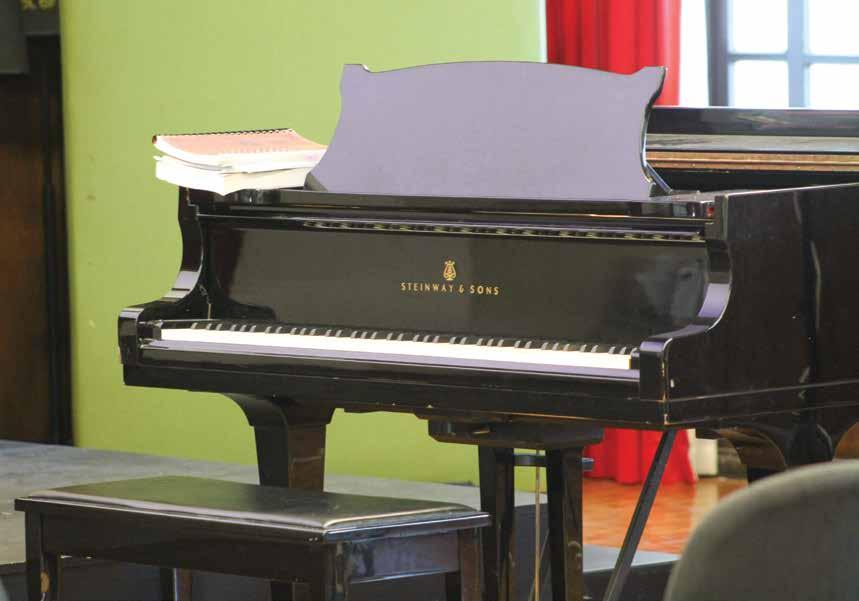
LAYOUT : Sectrix
MEMBERSHIP ENQUIRIES to the SecretaryPO Box 4, RUNDLE MALL, SA 5000 Mobile: 0402 575 219
E-mail: info@mtasa.com.au
ADVERTISING - please contact the Secretary
Please see MEMBER INFORMATION page for Advertising Price List.
DEADLINES FOR 2024
Contributions to SA Music Teacher are most welcome. All items to be included must reach the Editor (info@mtasa.com.au) no later than these deadlines:
Monday April 29th, Monday July 29th, Tuesday October 29th.
SOME CONTRIBUTING GUIDELINES
All text is to be submitted to the Editor for review.
Italics and inverted commas for quotations - text is to be either in Italics or inside inverted commas, not both.
Single inverted commas to be used; double inverted commas only inside single inverted commas.
The inverted comma at the end of a sentence is to be inside the fullstop; outside for ! and ?
MTASA WEBSITE
Please visit mtasa.com.au
MTASA FACEBOOK
Please visit the MTASA Facebook page at www.facebook.com/MusicTeachersSA/
Rae
Rae

Sunday, 7 April 2024
Saturday, 29 June 2024
August 2024
Sunday, 18 August 2024
Sunday, 17 November 2024 Concert
The following teaching rates are recommended to members by the MTASA Council for 2024.
Membership Subscription Renewals for 2023/2024 was due on June 30. Subscription renewal notices were sent in late June via e-mail to remind members to log in and renew their membership for the 2023/2024 financial year. If you are a Full member you will be asked to indicate that you have completed seven hours of Professional Development during the previous twelve months. If you don’t receive an e-mail please check your spam folder. You can log in at any time to renew your membership. If it seems that you didn’t receive an e-mail, have forgotten your username or are having problems logging in please contact the Secretary (info@mtasa.com.au). Paper invoices were sent to members who prefer to receive them.
Full members of the Music Teachers’ Association of South Australia may use the letters MMTA (member of Music Teachers’ Association) as a post-nominal while they are financial members. Interstate Music Teachers Associations are also encouraging their members to use this or a similar post-nominal.

The following teaching rates are recommended to members by the MTASA Council for 2024.
Full Member - $80 per hour Student Member - $55 per hour
Membership Subscription Renewals for 2023/2024 was due on June 30. Subscription renewal notices were sent in late June via e-mail to remind members to log in and renew their membership for the 2023/2024 financial year. If you are a Full member you will be asked to indicate that you have completed seven hours of Professional Development during the previous twelve months. If you don’t receive an e-mail please check your spam folder. You can log in at any time to renew your membership. If it seems that you didn’t receive an e-mail, have forgotten your username or are having problems logging in please contact the Secretary (info@mtasa.com.au). Paper invoices were sent to members who prefer to receive them.
Full members of the Music Teachers’ Association of South Australia may use the letters MMTA (member of Music Teachers’ Association) as a post-nominal while they are financial members. Interstate Music Teachers Associations are also encouraging their members to use this or a similar post-nominal.
MTASA has introduced a Professional Learning scheme for Full members. This commenced on July 1, 2019 when Full members began accumulating their seven hours of Professional Development. The scheme is designed to underpin and enhance MTASA’s established reputation for the professional excellence of its members, ensuring its standards are fully compliant with current educational expectations. These are clearly outlined in the Australian Professional Standards for Teachers (visit www.aitsl.edu.au/teach/standards) and similar documents.
From July 1, 2020 onwards Full members, when renewing their membership, will be asked to tick a box declaring that they have undertaken at least seven hours of Professional Learning during the previous twelve months.
The following examples are provided to give general guidance for Full members about Professional Learning that would be acceptable to MTASA.
These examples represent only a small sample of all the possibilities available to Full members. Generally Full members should feel comfortable about their own choices but in case of doubt you are welcome to contact the Secretary for further advice (info@mtasa.com.au).
Improved music teaching should be a major factor in all activities that Full members wish to count towards their MTASA Professional Learning.
MTASA will undertake random checks from time to time to ensure the system is working properly. So, on very rare occasions a Full member may receive a request from the Secretary for information about their Professional Learning. In such instances you may submit evidence such as certificates, programs, diary notes, recordings and so forth.


Examples of Professional Learning that would be acceptable to MTASA:
1. Online.
Attending a webinar or similar event; undertaking an online e-learning course.
2. Face-to-Face.
Attending a conference, workshop, masterclass or lecture.
3. Formal Study.
Undertaking a qualification or part-qualification delivered by a recognised institution.
4. Personal Research.
Studying books, journals, articles, musical scores, musical theory, analysis, etc., which lead to an example of improved music pedagogy and/or pupil performance.
Self-conducted research leading to a presentation, masterclass or workshop at a conference.
Composing an educational piece of music that motivates a group of pupils.
5. Team Research.
A joint project with others that achieves particular improvements in a training ensemble.
Joint creation of music teaching materials that improve learning in a group of pupils.
Remember! These are only a few amongst many possibilities. MTASA is a community of creatives. You are encouraged to be creative in your Professional Development!


As a member of Educators SA, MTASA can offer benefits to its members. Here are some offers:
Andersons Solicitors offer MTASA members:
• 10% off legal services, in ALL areas.
• Free initial phone conversation with a lawyer.
When contacting Andersons Solicitors tell them you are a member of MTASA, which is a member organisation of Educators SA (CEASA). Visit the website at www.andersons.com.au/.
Credit Union SA has a range of education only offers. Visit the website at www.creditunionsa.com. au/community/education-communitybanking-benefits/ for more information.
Have you fulfilled the requirements for Full Membership? Student members are reminded that Student membership is restricted to four years after which time it is expected that they would be eligible for another membership category, either Full Membership by Tertiary Study or Full Membership by RPL (Recognition of Prior Learning and Experience). Student members who are ready to upgrade their membership are invited to submit an application form to the Secretary together with the required supporting documents. Criteria can be downloaded from the MTASA website (www.mtasa.com.au) or obtained from the Secretary (info@mtasa.com.au).
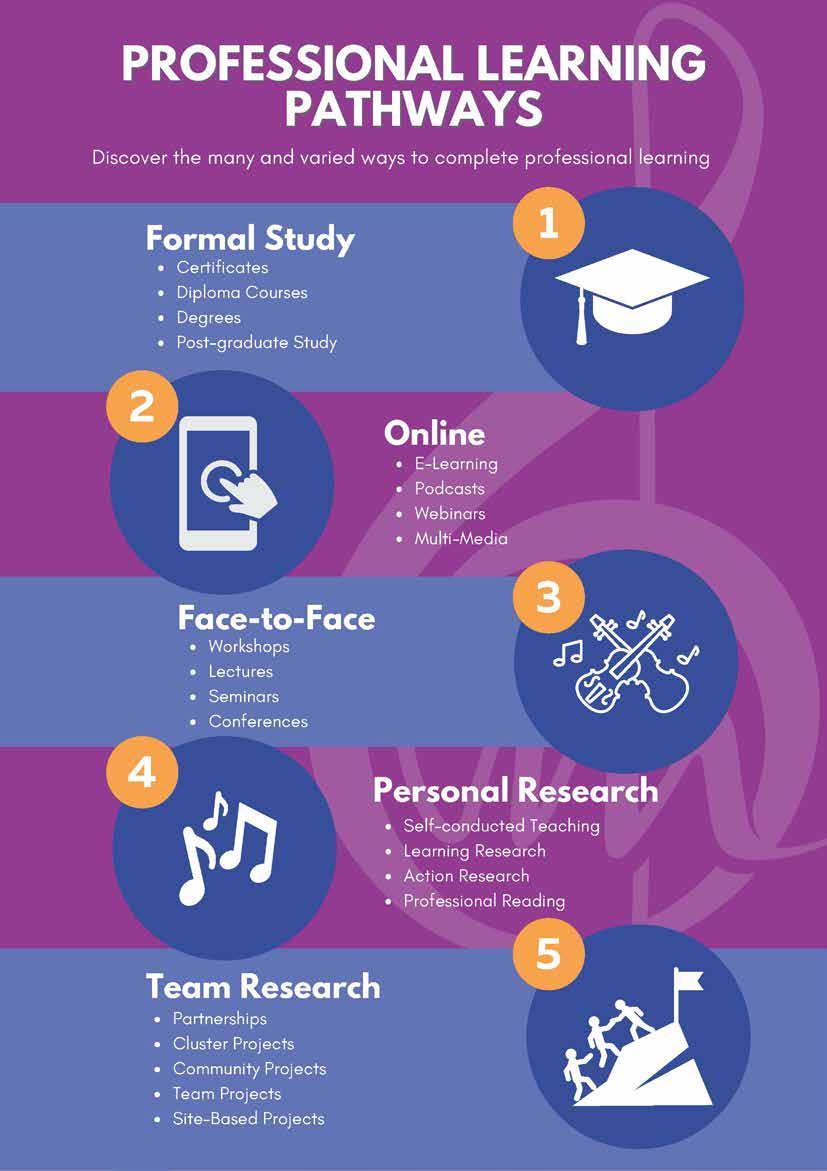

New Legislation regarding Child Protection was introduced with effect from September 1, 2019. A ‘Police Check’ is now known as a ‘Working With Children Check’ (WWCC). The Working With Children Check is the most comprehensive check that exists. Anyone found guilty of breaching this legislation can be fined up to $120,000.
People working or volunteering with children in South Australia must, by law, have a Working With Children Check. A DHS/DCSI child-related check will be recognised as a Working With Children Check until it expires.
People need a Working With Children Check if they are in a ‘prescribed position’. This means people who are in paid or volunteering roles where it is reasonably foreseeable that they will work with children; run or manage a business where the employees or volunteers work with children; are employed to provide preschool, primary or secondary education to a child.
A Working With Children Check is needed for all schools (Government, Catholic and Independent).
For further information go to www.screening. sa.gov.au/types-of-check/new-working-withchildren-checks.
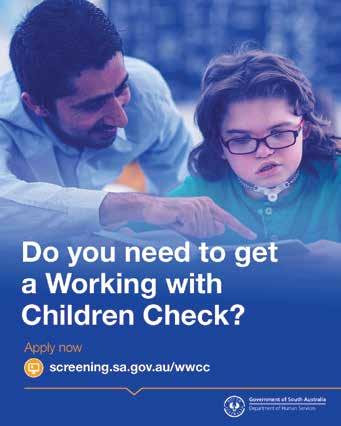
Enthusiastic volunteers are needed to help with various jobs at MTASA events. Tasks include setting up the venue, helping with registration at the check in table, ushering, assisting performers, helping with meals, and packing up afterwards.
It is a great way to network and a volunteering certificate will be provided, which will enhance your CV!
For more information, please e-mail the Secretary at info@mtasa.com.au.
In recent years each issue of SA Music Teacher has included an article about music teaching in a country region of South Australia. There are some regions that haven’t been visited yet. If you haven’t done so please write something – it doesn’t need to be very long – and also include a photo. If you have written something before you are welcome to send an update. E-mail the Secretary at info@mtasa.com.au.

Visit mtasa.com.au/index.php/members/becomea-member/ to join MTASA.
Current Full, Student or Associate Members are not required to submit any supporting documentation to continue their MTASA membership. Anyone applying for Full Membership (either Tertiary Level Qualification and Study or Recognition of Prior Learning and Experience) or Student Membership for the first time must fulfil all of the requirements listed and submit the appropriate supporting documentation. Associate Membership is no longer being offered but those who were Associate Members on September 24, 2017, can continue their membership provided they remain as financial members. Full Membership (Recognition of Prior Learning and Experience) has replaced General Membership.
MTASA Members are always encouraged to write to the Secretary about any concerns that they may have. The MTASA Council will consider your request.
To be listed in the ‘The Directory of Teachers of Music’ on the MTASA website as a teacher of theory/musicianship applicants for Full or Student membership must supply evidence of having completed studies in this field to at least AMEB 5th Grade theory/musicianship standard or equivalent. Full, Student or Associate MTASA members wishing to have theory and/or musicianship included in their Directory listing should send copies of the relevant certificates to the Secretary (info@mtasa.com.au).
The Editor is always looking for things to include in SA Music Teacher. Articles can be about any music related topic. If you would like to write an article this is your invitation! A helpful hint, a comment, a joke, a poem, a cartoon, etc. … please e-mail them to the Secretary at info@mtasa.com.au.
We invite organisations to partner with MTASA on our website. Benefits include advertising via a clickable link and two free tickets to our events for an annual fee of just $100. Please go to our website.
MTASA Members, free. Non-members, $17.
Please contact the Secretary (info@mtasa.com.au) about advertising.


My body’s tired and brain’s nearing overload after returning home from MTASA’s two-day summer conference.
In 48-hours I’ve had a six-hour road trip with two of my favorite people, both fellow music teachers from the Riverland, two nights away from my own bed and too much time sitting and eating.
Yet I’m also simmering with excitement at the prospect of resuming teaching, recharged by technology tips, piano technique demonstrations and the challenge to discover or remember why we teach.
I’m uplifted by the validation and inspiration of being in a room of people who believe in the power of music lessons.
It was my first MTASA conference, having joined the association last year after leaving a career in journalism to concentrate on music and teaching. The media door hasn’t fully closed behind me though (as I’ve found myself back at the ABC as a news editor this month) so I happily accepted an offer by MTASA president Sophie Arhontoulis to write an article about my conference experience. Aside from a word limit of ‘not thousands’ I was given free rein and it felt most comfortable to share my favourite moments, so here they are.
1. Pat Wilson telling her story of being left in a cardboard box at a babies’ home then adopted into a musical family. Her advice to find our
own song and to sing it resonated beautifully.
2. Rae de Lisle using the rhythm syllables of Daniel Wong’s name to help him play a Kabalevsky piece, creating a very memorable masterclass. I’m eagerly awaiting a copy of her book Fit for Piano.
3. Violinist Haneulle Lovell and pianist Nicky Poznak. Their performance of a Franck sonata alone would have more than justified the conference entry price.
4. The mood quadrants with Nathan Jones (they prompted me to head outside for fresh air and movement mid-presentation … but I will be following him for more thought-provoking content).
5. The chrome transpose extension with Antony Hubmayer. Who knew there was a free and easy tool that I could use to instantly transpose YouTube backing tracks for singing students?
6. Exploring AMEB RockSchool syllabus and collaborative exams.
7. Thomas Saunders’ suggestion to check out the Newzik music reading app to generate MIDI files to create Synthesia videos of any sheet music for students who prefer learning that way.
8. The lemon slice (and all the other delicious food).

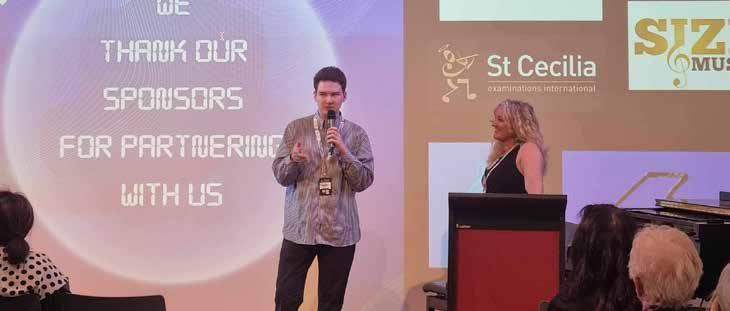
9. Neurodiversity and the growing recognition and interest in the different ways our brains work. Daphne Proietto’s performers and their stories of life and music with autism and ADHD.
10. Pat Wilson going off script introducing Pete Barter… and then his high energy presentation. Not an easy task to go last and it was the energy boost I needed at the end of a big couple of days!
These were my highlights from the MTASA’s summer conference, but I have no doubt everyone
who attended would have a different list and that’s the point.
Allowing time for professional development has expanded my music tribe, provided new teaching tools, and delivered a big dose of motivation. I’m already looking forward to the next MTASA summer conference (and hoping it will also feature lemon slice and Pat Wilson).
Catherine Heuzenroeder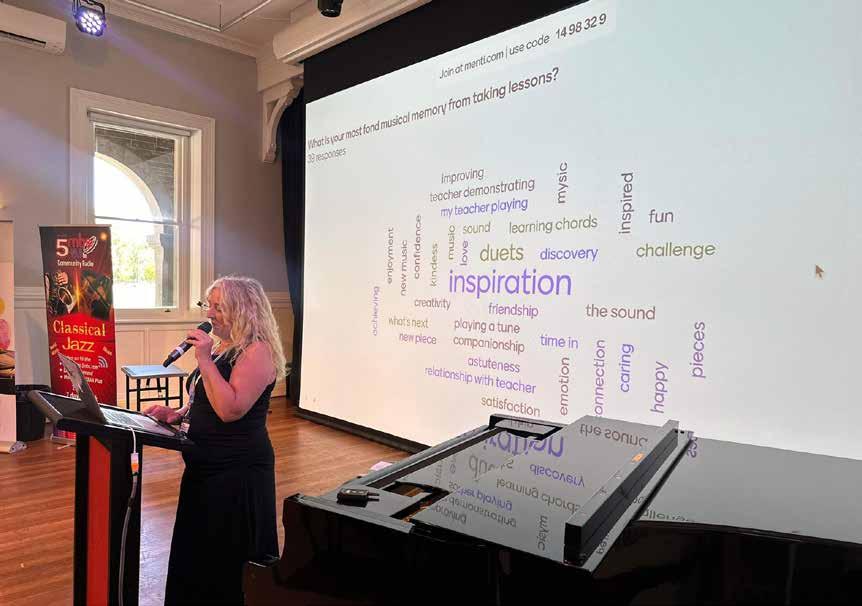


The MTASA Summer Conference was fortunate to be able to engage this outstanding New Zealand pianist and teacher as one of its Keynotes. She conducted three sessions, the first centred on her internationally successful publication Fit 4 Piano, the second in which she performed and outlined the contents of her recent volume Fit 4 Piano Etudes, and the third in which she conducted a master class.
All her sessions were compact, focused and delivered with engaging charm and conviction.
Fit 4 Piano is a collection of keyboard exercises that focus on some of the essentials of keyboard technique ranging from elementary to more advanced. This is all part of her desire to encourage
pianistic physical and mental good health. Some listeners might have seen a parallel with the AMEB’s technical exercises.
The book itself is available in both eBook and hard copy formats together with a multiplicity of video recorded demonstrations. It makes the assumption that player age is probably a key element, cleverly moving its illustrations and language from simple to more complex to suit the pupil concerned. Rae de Lisle demonstrated this during her masterclass when she engaged each of the five players with an exercise or two from her book that assisted their situation. The masterclass was also a cogent demonstration of good teaching practice as she sensitively encouraged each player to attempt
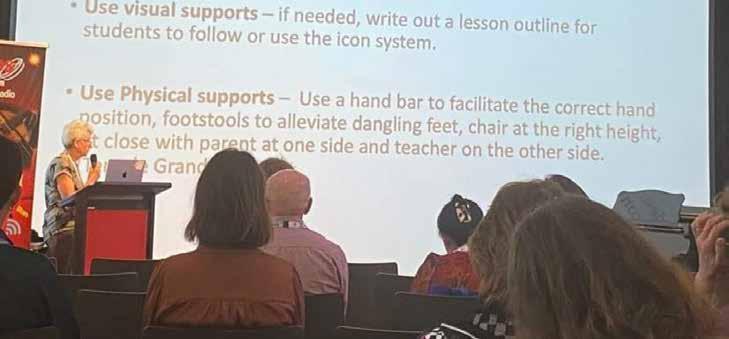


some new things. And the class ran to time almost to the minute – illustrative it seemed of her attention to detail.
Rae de Lisle’s Fit 4 Piano Etudes are an example of determination and tenacity on her part to involve twelve of New Zealand’s foremost composers in writing music to help pianists overcome particular technical challenges while enjoying fine musical content. All save one fulfilled the brief of writing music to only a moderate standard of difficulty. One piece proved far too difficult however, but she included it nevertheless and furthermore commissioned a recording using two pianists simultaneously (one for the Right Hand, one for the Left Hand). Clearly Rae de Lisle is a force to be reckoned with!
Keynote Daphne Proietto proved a most persuasive advocate for the benefits of music in the lives of young people with special needs, especially Autism. Her Foundation, Keys of Life, based in Melbourne is daily bring this into reality for many children. Furthermore, she gave timely and sage advice to teachers who may find themselves with such pupils and who may feel nervous about the correct approaches to adopt.
Perhaps most powerful were the testaments of the three students she brought with her from Melbourne, all with special needs and all of whom performed beautifully for conferees as a piano, 12
violin and cello trio.
Of course, without knowing, listeners would have been unaware of their particular situations, as their playing was unfailingly musical and confident. So, the value of Daphne Proietto’s presentations lay in advice she gave listeners followed by the live demonstration of the results in the performances.
A little knowledge can be a dangerous thing and your reporter will therefore refrain from giving excerpts from the detailed information Daphne Proietto imparted. Suffice it to say that the Keys for Life Website contains details of short courses that teachers can undertake to familiarize themselves with the methodologies to employ. Readers should know that Daphne Proietto’s first presentation dealt with cases of Autism and ADHD while her second session covered aspects of learning music with Blindness and with Cerebral Palsy.
These are immensely important matters and Daphne Proietto dealt with them in a respectful and straightforward fashion that hopefully will inspire conferees to better familiarise themselves with the subject. We are immensely grateful to her for taking such care over her presentations.
Rodney Smith.
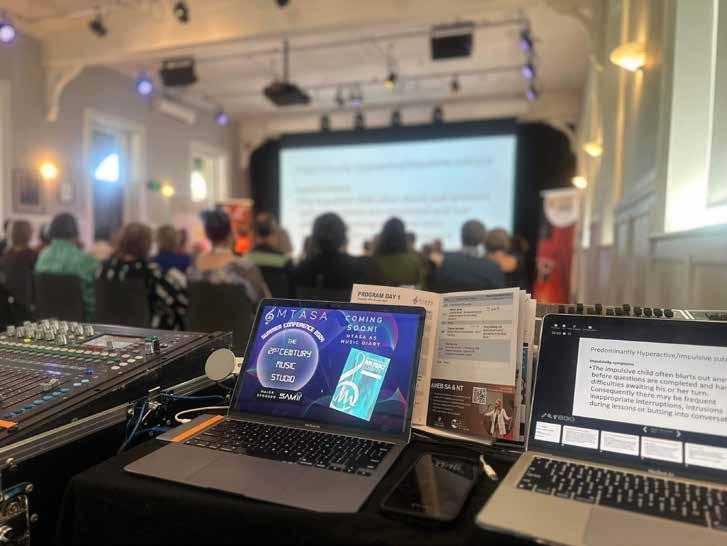
Poor Mr Jones was scheduled to present this session after lunch and a glittering Student Showcase. Rendered sleepy from good food followed by exquisite music, we might not have been the snappiest of audiences. Compounding his task was the fact that he was in Bali and had to deliver his talk online. Anyone who had to give a Zoom class in the Plague Years knows how onscreen presentation can suck the life out of the most vivacious of presenters. Jones had a tough task ahead of him. Despite all this, his hour session was filled with practical insights; the presentation was conversational, colloquial, lively and thoughtful.
Jones has a strong background in music and media, as well as holding three psychology degrees; his subject matter related readily to educators and
performers. His extensive CV also includes Director of The Mood Institute, which provides innovative, evidence-based emotional skills training. Jones’s entertaining talk continually referenced the welldocumented associations between music and emotions via the building of emotional intelligence.
He used a simple quadrant diagram to illustrate energy versus emotion, with a vertical line for Arousal (from low to high energy), and a crossed horizontal line for Valency (which I privately summarised as an emotional continuum from Grumpy to Joyful). Quadrant contents included Vitality, Sublimity, Unease and Aggression. But there was a whole lot more than that diagram.
Jones riffed easily through the academic

(2008) amongst others. It is evident that his PhD research work has laid a coherent foundation for what some might call a “wafty” subject. But any music educator needing to create and maintain an atmosphere for students which fosters learning, experimentation, encouragement and curiosity could glean much from his canny, practical observations.
This was a session which offered useful analysis of the delicate nuances within teacher-student
the underlying science. Nathan Jones wears his erudition lightly and shares it clearly and generously; he’s a useful person for any music educator to know.
Pat. H. WilsonZentner, M., Grandjean, D., & Scherer, K. R. (2008). Emotions evoked by the sound of music: characterization, classification, and measurement. Emotion, 8(4), 494.
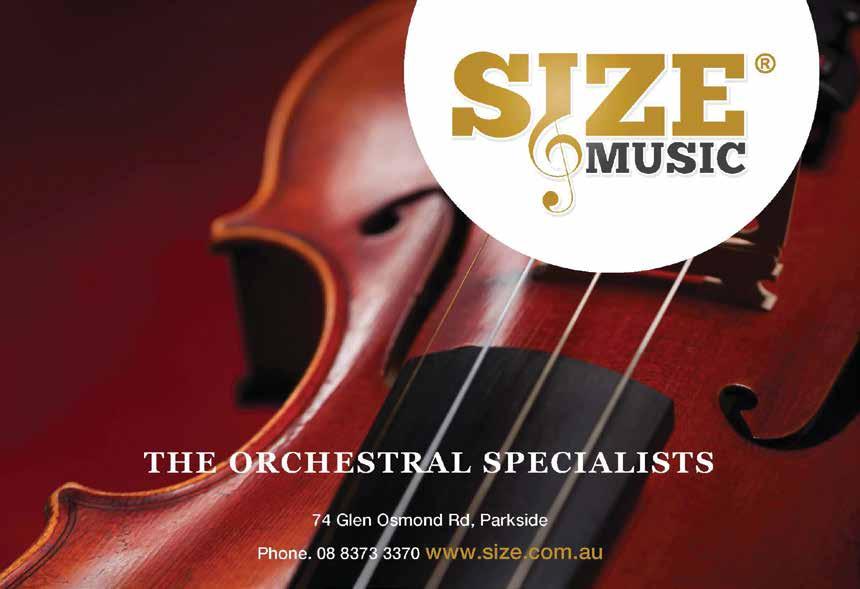

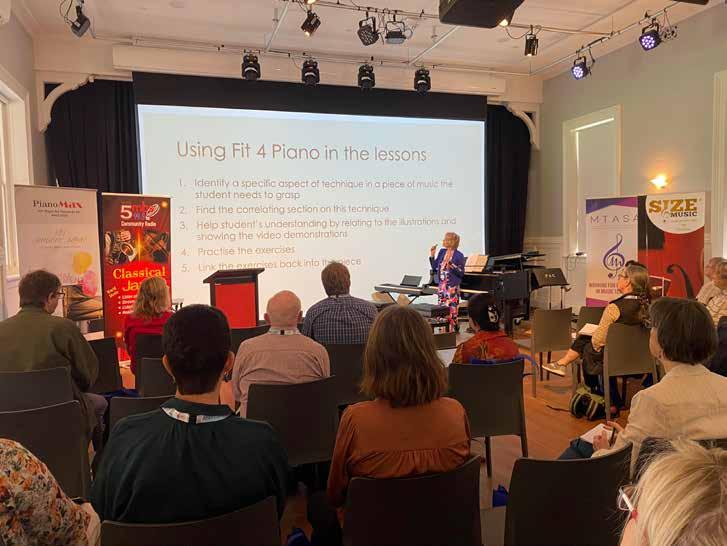
In the realm of musical education, the recent MTASA Summer Conference 2024 provided a platform for the convergence of scholarly minds and artistic prowess. Among the distinguished contributors, Rae De Lisle’s masterclass emerged as a focal point, captivating the attention of those seeking a deeper understanding of piano pedagogy.
This review endeavours to dissect the intricacies of De Lisle’s recent masterclass, employing an analytical lens to examine the theoretical foundations, pedagogical methodologies, and overall merit embedded in her masterclass.
The first performer, Elena, took centre stage, presenting Clementi’s Opus 36 No. 1. In this enlightening session, De Lisle shared invaluable tips, touching upon critical aspects such as
optimal seating distance, the nuanced execution of scale passages, and a unique approach using snake imagery to regulate and refine the pianist’s technique. Through De Lisle’s guidance, Elena’s performance became not only a musical presentation but also a canvas for incorporating essential techniques that enhance both technical precision and artistic expression.
Following Elena, Ella took the stage, showcasing her talent through Berceuse (Grade 6). Rae De Lisle’s guidance illuminated Ella’s rendition, emphasising the importance of the first two bars where the melody should resonate distinctly, creating a different sound that is both cantabile and expressive. De Lisle introduced the concept of adding each note with arm and flexibility, urging

the essence of a “golden hand”. Furthermore, attention was drawn to the left hand, advising that it should play lightly. As the performance progressed to the second page, De Lisle directed Ella to bring out the top notes, ensuring they sang with resonant clarity, thereby elevating the overall musicality of the piece.
Chloe took the stage next, presenting “Mountain Village” at Grade 4 level. Rae De Lisle’s guidance during Chloe’s performance centred on the refinement of wrist technique through dedicated practice, incorporating a flexible wrist approach. De Lisle introduced the concept of a windmill-shaped phrase, encouraging Chloe to explore the dynamic contours of the piece. This insightful advice not only contributed to the technical finesse of Chloe’s rendition but also added an expressive layer to the portrayal of “Mountain Village,” transforming it into a captivating musical narrative.
Nicholas followed, presenting a Haydn Sonata at Grade 5 level. Rae De Lisle’s guidance focused on the integration of both arm and finger movements, likening it to a swimming motion that facilitates a seamless transfer of sound between the hands. De Lisle emphasised the importance of rotational techniques, enhancing the overall fluidity of Nicholas’s performance. Specific attention was drawn to the dynamic balance, with De Lisle advising to accentuate the top notes for prominence while maintaining a softer touch in the left hand, reminiscent of a delicate guitar. This nuanced approach not only elevated Nicholas’s rendition but also underscored the intricacies of Haydn’s Sonata, bringing forth a harmonious interplay of technique and musical expression.
Kabalevsky’s Sonatina at Grade 4 level. Rae De Lisle’s guidance for Daniel’s rendition delved into the nuanced expression of emotions throughout the piece. In the initial segment, De Lisle encouraged an energetic portrayal, prompting Daniel to infuse enthusiasm into the right hand, creating a sense of excitement. Transitioning into the second part, emphasis shifted to a calm demeanour in the right hand, while the left hand maintained a delicacy achieved by keeping the fingers close to the piano keys. De Lisle further advised on achieving a depth of touch, allowing the right hand to sing with resonant clarity. Simultaneously, the left hand was to maintain a light touch, akin to a feather’s gentle descent, aiming for a performance to harmoniously balance technical precision with emotional nuance. Rae De Lisle’s masterclass shone as a beacon, drawing together scholarly minds and artistic brilliance. As we reflect on the insightful journey through the various performances guided by De Lisle, a rich tapestry of pedagogical methodologies, nuanced techniques, and profound musical expression unfolds. We still feel the enduring impact of Rae De Lisle’s masterclass, leaving an indelible mark on the landscape of piano pedagogy and contributing to the ever-evolving symphony of musical education.
Pat Wilson and Sofie Arhontoulis
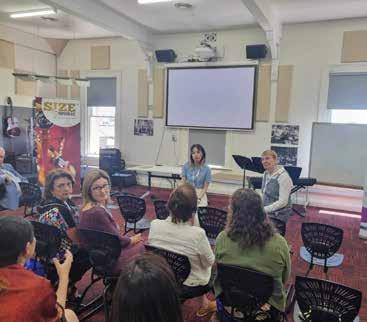

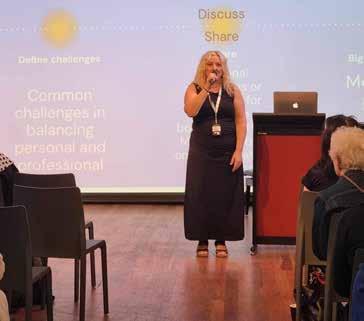
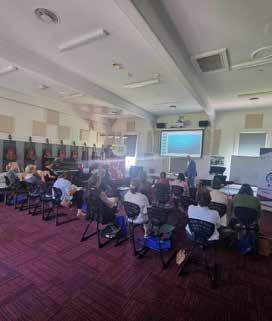
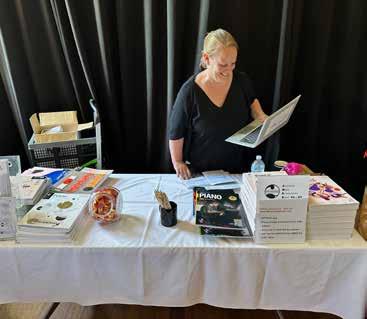
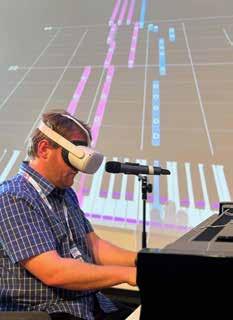
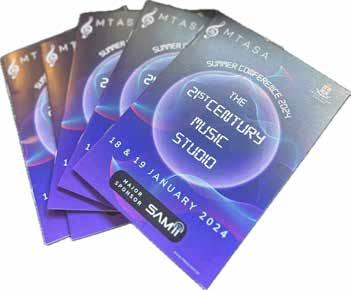

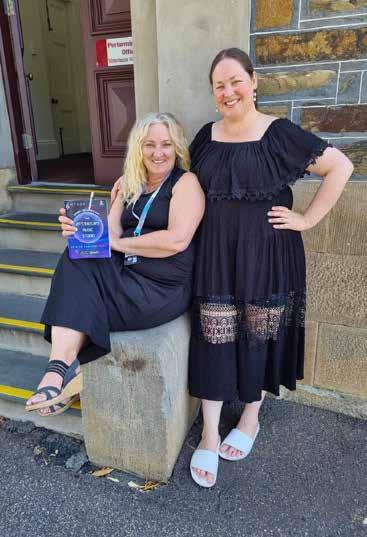
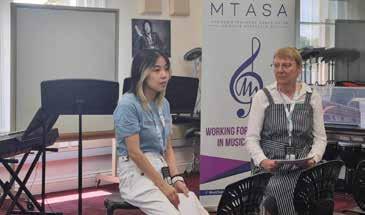
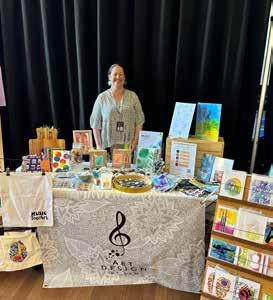

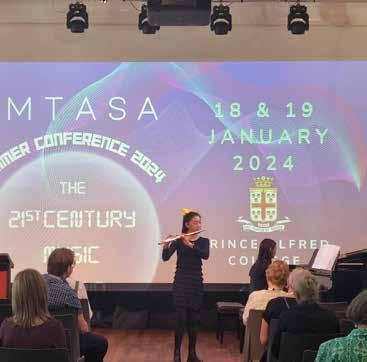


Embracing Change: Unleashing Potential Through Self-Discovery In the ever-evolving realm of music education, adaptability and self-awareness stand as pillars of progress.

I recently addressed the Music Teachers Association of South Australia Summer Conference, using a phrase “Nothing changes if nothing changes.”
I urge educators to embark on a transformative journey by delving into their psychometric profiles. Understanding ourselves is the first essential of progress.
I encourage educators to explore the 16 Personalities framework, a tool that unveils the intricacies of one’s character. For those ready to embark on this voyage, a QR code accompanies this piece, providing direct access to explore my own personality and to discover yours.
By understanding the nuances of our strengths and weaknesses, we lay the foundation for informed growth. Every educator, much like a musical composition, is a unique arrangement of traits,
skills, and tendencies.
The psychometric profile test serves as a score, deciphering the melody of our personalities. Through introspection, we unlock the potential for refining our teaching methods, communication styles, and interpersonal relationships. Identifying our strengths becomes the forte of this exploration.
Armed with this self-knowledge, educators can strategically leverage their strengths to orchestrate engaging and effective learning experiences. It is not merely about embracing what we excel in but also finding harmony in collaboration, allowing the strengths of each member to harmonise and create a richer educational symphony.
Equally crucial is acknowledging our weaknesses, for in this recognition lies the key to orchestrating change. Instead of dwelling on shortcomings,

for weaknesses, finding innovative solutions or seeking support where necessary. The beauty of our profession lies in its constant evolution, and the courage to confront and address weaknesses is the crescendo that propels us forward.
By sharing my psychometric profile openly, I invite fellow educators to embark on this journey of selfdiscovery. In this collective exploration, we foster a culture of understanding and mutual support within the Music Teacher Association of South Australia. Together, we harmonize the diverse melodies of our personalities, creating a vibrant tapestry that enhances the educational landscape.
In conclusion, the adage “Nothing changes if nothing changes” serves as a poignant reminder for educators. Embrace the transformative power of self-discovery through psychometric profiling, and let it be the catalyst for positive change. As we navigate the symphony of education, let our collective melodies resonate, creating an enriched, harmonious experience for both educators and students alike.
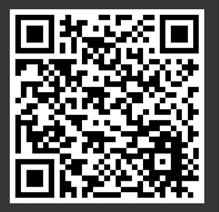
Personality Assessment:
Discover more about yourself with a personality test. Visit 16 Personalities and see your results: See My Results
www.16personalities.com ( take the test )
Pete’s resultshttps://www.16personalities.com/profiles/ d8af94570a2fa
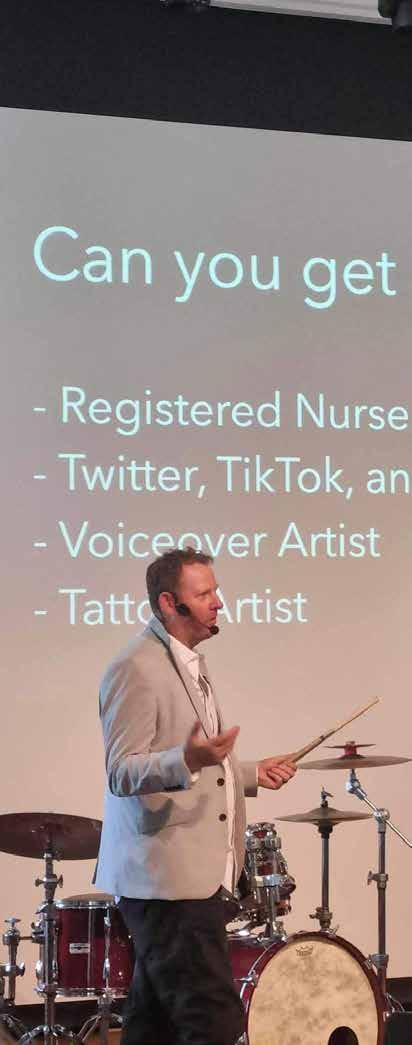
 by Shelley Walker and family
by Shelley Walker and family
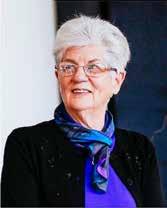
A past President (1991–1995), Council Member and Life Member of the MTASA, Nina Murton (L.Mus.A., B.Mus., Dip. Ed.), died recently at her home in Bellevue Heights, on 28 October 2023, having lived a full and musical life for 89 years.
Just seven months earlier, Nina had lost Jim, her beloved husband and life-partner of 67 years. They were always a team and their loving commitment to one another never wavered. For his part, Jim did everything he could to encourage Nina to develop into the accomplished musician, teacher and mentor she undoubtedly became.
Nina was born Decima Aimee Nina Feirclough on 30 May 1934 in Tumby Bay, the third of Roy and Amy Feirclough’s four daughters. Despite having three first names, she was always called Nina and spent her early life in Cummins, a prosperous farming community in central Eyre Peninsula. Her parents Roy and Amy ran their own businesses in the town and the family regularly attended Cummins Methodist Church.
Nina did well at Cummins Area School, winning many prizes. She loved maths, sport and art, but she especially loved music and her piano teacher, Sally Drummond, who helped her progress rapidly. Sally was a gifted musician and educator who encouraged many young people from the surrounding area to learn piano and enjoy music for its own sake.
Sally was so effective as a teacher that Nina was one of several of her students who went on to study at the Conservatorium of Music in Adelaide, becoming some of the finest musicians and performers in the state, including the late David McSkimming OAM. Nina went on to learn from Raymond O’Connell and Lance Dossor.
On 21 January 1956, Nina Feirclough (21) married Jim Murton (25) in Cummins Methodist Church
and after a few years—following a radical change in Jim’s vocation, from heavy machinery mechanic and garage manager to a Methodist minister and later, industrial chaplain—they shared eight more homes across the state, moving from Cummins, to Parkside, Streaky Bay, Stansbury, Whyalla, Belair, Highgate, Coromandel Valley and finally, Bellevue Heights.
In every location and stage of family life, Nina continued her education and career as a musician, performer, accompanist, teacher, coach, conductor and later, AMEB examiner, over a span of seven decades. Nina also used her musical gifts to serve both the church and the wider community, playing for Sunday services, coaching and accompanying choirs and soloists (voice and instrumental), often for special concerts or events.
Nina’s association with the MTASA was a long and fruitful one. She cared deeply about pedagogy and keenly supported the aims of the Association, especially professional development for teachers. In 1990, Nina wrote A History of the Music Teachers’ Association of South Australia: 1930 – 1990 to commemorate the 60th anniversary.
To summarise a life like Nina’s in so few words is a near impossible task, given how much she packed into it. But perhaps the following anecdotes, shared at her funeral wake last November, best encapsulate the person, teacher and musician she truly was.
The mother of one of Nina’s long-term students confessed that she once suggested to her teenage son that he give up learning the piano. It had always been such a struggle and she felt sorry for him. But he refused. Despite the struggle, he couldn’t bear the thought of giving up his weekly lessons with Nina—he loved his lessons with her so much.

Blackwood UC often coincided with Nina’s practice on the church organ. Sometimes the children asked to go in and listen to her play, which undoubtedly delighted her no end—Nina was always ready to share her love of music with children. So, she would stop playing and show them the parts of the organ, demonstrating the sounds it could make. Apparently, one little boy was so entranced by her playing, he refused to leave the church until she had completed her entire practice session.
By Nina’s children, Shelley Walker, Lee Carter and Ian Murton.
Our thanks to Nina’s friends and former colleagues, Margaret Lange OAM and Jeffery Kong, former Head of Music, Brighton Secondary School for their help with dates and details (below).
Piano teachers: Sally Drummond, Raymond O’Connell, Lance Dossor
Violin teacher: Clarice Gmeiner
Organ teacher: Christa Rumsey
1951 – 1952 Studied towards Diploma of Music, University of Adelaide, in piano and violin (suspended study to care for mother)
1958 Licentiate of Music, piano, AMEB
1979 Bachelor of Music, University of Adelaide
1980 Diploma of Education, University of Adelaide
1990 – 1997 Studied organ at Flinders Street School of Music (TAFE)
1953 – 2019 Private piano teacher, beginners to A.Mus.A. level, children & adults
Accompanist for vocal, brass, woodwind, strings & percussion students in AMEB, Year 12 and tertiary examinations & performances, and for professional artists
1961 Piano soloist, ABC Radio Young Australia program
1971 – 1998 Instrumental teacher and accompanist with Music Branch of SA Department of Education (mostly part-time), including:
Strings teacher & accompanist, Whyalla, in primary & secondary schools; appointed by the SA Department of Education’s first Country Music Adviser, John Lange; also accompanied choirs initiated by John Lange
1975 – 1985
Official accompanist for the SA Public Primary Schools’ Music Society; presented programs of songs at workshops, visiting schools throughout Salisbury/Elizabeth & Adelaide metropolitan area, rehearsed with choirs and accompanied final performances in Festival Theatre, Adelaide
1975 – 1998
Peripatetic piano teacher in various primary and secondary schools, especially Brighton and Marryatville Special Interest Music Schools; remembered by Jeffrey Kong (former Head of Music at Brighton) as “a much-admired teacher who produced many outstanding musicians”
1980s/1990s Solo concert pianist, in two ASKM Chopin Festivals
Duo concert pianist with Judith Nurton; performed at lunchtime concerts, Edmund Wright House, Adelaide; at 1987 RSCM Summer School, London; and at other venues
1990 Writer, A History of the Music Teachers’ Association of South Australia: 1930-1990
1991 – 1995 President of MTASA and continued later as Council member
2000 Life Member of MTASA
2000 – 2007 AMEB Examiner (piano)
Accompanists Guild of South Australia
Australian Society for Keyboard Music (ASKM)
Institute of Music Teachers
Music Teachers’ Association of SA
Royal School of Church Music (Aust.)

An excerpt from ‘A History of The Music Teachers’ Association of South Australia Inc.’ by Nina Murton.
The arrival of the first piano in South Australia.
When in 1836 Lady Hindmarsh was preparing for the journey she and her husband Governor Hindmarsh were to make from Britain to the other side of the world, what did she think of to pack? What, for a Governor and his Lady, would be the essentials needed to enable them to live as the Vice-regal couple in the new free settlement of South Australia?
Adelaide, the capital, was just a cluster of tents on the banks of the River Torrens, and Government
House a three-roomed thatched cottage. Yet, among all the food, clothing, furniture and other myriad items packed aboard HMS Buffalo there was found enough room for Lady Hindmarsh’s piano.
The piano arrived safely with them when the ship anchored at Holdfast Bay on 28th December 1836 and it was duly transported across the Adelaide plain to Government House. There the Australian summer played havoc with the tuning, but Mr Stephens, the Colonial Secretary, was pressed into service to tune the instrument.
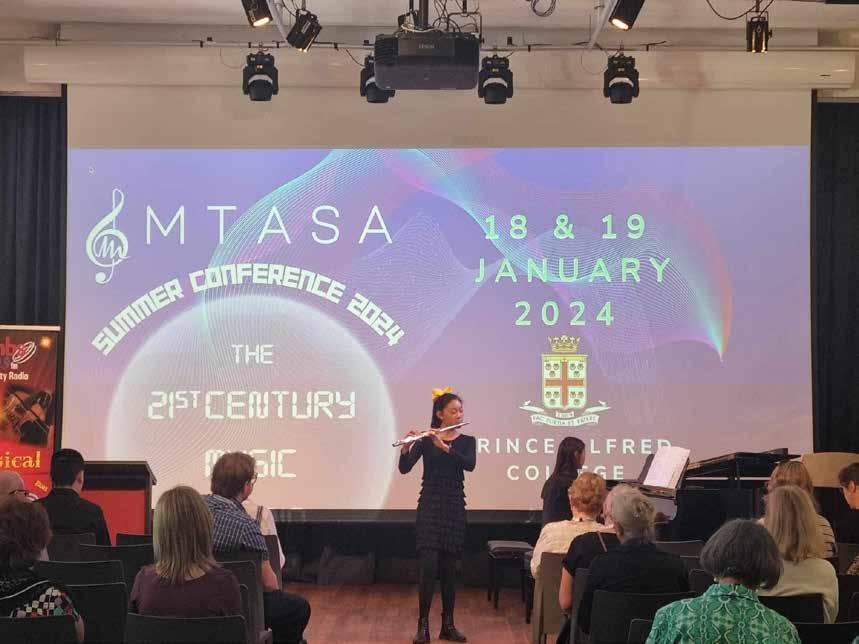

I hoist myself onto the conductor’s stool and place my music on the heavy black stand. Twenty-four classically trained choristers gaze at me expectantly.
Imposter syndrome prods me as I lead the choir through a first read of the Michel Legrand classic Windmills of your Mind. While the melody may be familiar, my arrangement is peppered with syncopation, difficult to sightread. I observe furrowed brows, tense body language and furious concentration. I wonder if I’ve included too much rhythmic complexity as each section slides out of sync with the next, heading towards chaos. I begin clapping on the downbeat to provide context, but this only augments the confusion. I bring the choir to a stop and take a deep breath. Clearly, I’m not the only one outside of my comfort zone.
I acknowledge the arrangement’s difficulty and urge the choir to not feel despondent. The rhythmic pulse will come with time and familiarity. I hesitantly ask our répétiteur if I may take the wheel. I slide onto the piano stool, feeling myself relax. I have never felt at home on the podium. But the piano and I are old friends.
After a year of toil and turmoil at the Elder Conservatorium amidst a cohort of serious, solitary pianists with no desire to establish community, I realised that I am truly an ensemble musician at heart. Having spent many more hours singing with and arranging for two a cappella quartets of my own than practicing piano, it was time to follow my heart. My new career goal was to form the Australian version of The Manhattan Transfer. To do this, I needed to study jazz. To do this, I needed to pass an audition, aware that having sung Boogie Woogie Bugle Boy in the Adelaide Girls’ Choir did not constitute adequate preparation. I rang the Conservatorium jazz department and asked them to recommend a teacher.
Nervously knocking on Libby O’Donovan’s grungy Norwood share house door, I was not comforted by the imposing figure who answered. Bleached blonde hair gelled into spikes, heavy eye makeup, a leather choker and combat boots – if this was jazz, I knew I’d never be cool enough. But the deep end being an excellent place to learn, I soon became immersed in the stylistic language of this intriguing new country. Learning how to break every rule I’d been taught to strictly adhere to in the classical world was one thing – learning how to enjoy doing so was quite another.
Reflecting on this, I suggest the choristers adjust their posture. Ramrod-straight spines do not a relaxed groove make. I encourage the singers to lean back in their chairs, even slumping a little like recalcitrant teens. Thus repositioned, we focus on moving the syncopated emphasis towards the back of the beat. The result: frown lines lift, eye contact increases, the occasional smile emerges. The energy shifts.
Two months on, one chorister admits he’d been afraid he was an old dog, and this program would prove too much of a new trick. After our most recent rehearsal he tells me how much he feels he has improved and was even beginning to look forward to performing. This made me aware of how much the choristers have put themselves in my hands, as I have put myself in theirs, imposter syndromes flowing freely in both directions. Perhaps, I think, we can all agree to shed our narrow preconceptions and meet in this new realm with the curiosity and playfulness that embody the jazz idiom. Or, at the very least, enjoy a little communal frolic in the deep end.

As educators, it’s useful for us all to reflect on the ways in which our students learn. So this issue’s little chat is one which is relevant for all music teachers, not just singing teachers in the world of music theatre.
Let’s go back to how babies learn. They imitate. I don’t have to cite chapter-and-verse on this one, I’m sure. You do it, and that ever-observant kid copies you, sooner or later.
University of Washington studies (Saby et al., 2013) have even shown that a baby’s brain demonstrates specific activation patterns when an adult performs a task with different part of their body. You do something with your hands, and the “hands” section of the baby’s brain lights up in an MRI. Anyone who has ever watched a baby knows that the old “money see… monkey do” process is a major learning tool.
Every music teacher knows this. You demonstrate; they copy. How to hold a violin. Or a trumpet. Fingering for the very first scale on a clarinet. Setting up a drum kit. Hand and finger positions on a keyboard. You do it. They have a go at copying you. And – sooner or later – they get it.
If imitation is such a cornerstone of music education, ensuring the acquisition of those complex neuromuscular processes demanded by whatever your instrument is, then today’s Big Question is – what are your students listening to in between lessons? Why? Because that’s what they will unconsciously copy. In our game, it’s “monkey hear…monkey do”.
Marian Wright Edelman, the great civil rights activist, said “You can’t be what you can’t see”. My clumsy tweak of this saying is: “You can’t play what you can’t hear”? OK, it doesn’t rhyme. It’s still true. If your student is hacking their way through Telemann in your sessions but predominantly listening to metal, indie or rap for the rest of their week, no amount of historic information and intellectual appreciation will aid their artistry in bringing an authentic style and feel to the Allegro by Telemann (4th Grade violin). For my students, their ear needs to be tuned to the quality of tone currently demanded world-wide by the industry. If (for instance) you want to sing Galinda in Wicked, this is no R’n’B role. Hence, if my student is streaming nothing but Sam Cooke, Janet Jackson, Mary J. Blige and Usher, she is making life much harder for herself.
I once saw a presentation by the great French ENT and inventor Alfred Tomatis (1920-2001)
at a London ICVT conference. He spoke about his research, punctuating his presentation with demonstrations of voice science. By the time I saw him, certain of my colleagues whispered that he was a decibel short of a Bel, although his brilliance in auditory training was still evident. Tomatis always believed, “The voice can only reproduce what the ear can hear.” I’ll be bold enough to misquote that mad old professor – “You can’t play what you can’t hear”.
And herein lies the core of the question “What are you listening to”? Music theatre contains a dazzling gamut of genre styles, and anyone working in this field needs to understand the technical requirements and stylistic elements of each genre. Authenticity is all. Posture, breathing, larynx position, diction, rhythm, vibrato, paralinguistic vocal effects (grunts, groans, smears, growls), accent and appearance –all these differ across genres. Smart music theatre singers stream music theatre of all kinds.
The earbud, that universal fashion accessory, means that we shall have music wherever we go. And it’s of our very own choosing. Do keen young cricketers only watch baseball games when they aren’t training? Worse still, do young soccer players attend every AFL game while avoiding all soccer matches? Ask your students what they habitually listen to. Get them to show you their streaming list. Monkey hear… monkey do.
Saby, J.N., Meltzoff, A.N., Marshall, P.J. (2013). Infants’ somatotopic neural responses to seeing human actions: I’ve got you under my skin. PLoS ONE, 8(10): e77905. https://doi.org/10.1371/ journal.pone.0077905
Schiavio, A., Stupacher, J., Parncutt, R., & Timmers, R. (2020). Learning music from each other: Synchronization, turn-taking, or imitation?. Music Perception, 37(5), 403-422.
Simones, L., Rodger, M., & Schroeder, F. (2017). Seeing how it sounds: observation, imitation, and improved learning in piano playing. Cognition and Instruction, 35(2), 125-140
Waters, S., Kanber, E., Lavan, N., Belyk, M., Carey, D., Cartei, V., ... & McGettigan, C. (2021). Singers show enhanced performance and neural representation of vocal imitation. Philosophical Transactions of the Royal Society B, 376(1840), 20200399.


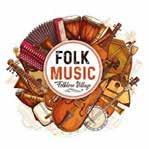

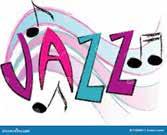







Readers are encouraged to visit The Australasian Piano Pedagogy Conference website where they can discover how things are progressing for the upcoming Conference to be held at Melbourne’s Monash University 8 – 12 July 2024. This will mark APPC’s return after a gap of five years largely due to the Covid pandemic. Not only are the Conference accommodation and other organisational issues becoming clear, but an impressively lengthy list of invited presenters is shown.
Rae de Lisle, is an old friend from our own conference, while Konstatin Shamray’s name is familiar to Adelaide audiences. Melanie Spanswick may also be familiar to MTASA members through her online Webinar for MTASA in November 2022. Lori and Lisa Bastien are making a return visit from the USA, while APPC’s Patron Piers Lane is giving the conference’s opening recital.
Professor Margaret Barrrett, is Head of the Sir Zelman Cowan School of Music where the Conference will be situated. She is a leading researcher in teaching and learning practices and in pedagogy and practices of creativity, while Katherine Zeserson has worked extensively in the UK, Europe and Brazil to design and lead programs on inclusive practice and creativity and improvisation in various cultural contexts.
UK Educator Paul Harris possesses an international following and has authored an extensive range of publications relating to music instrumental pedagogy from volumes on sight playing to his well-
known simultaneous learning approaches. Murray McLachlan, pianist, recording artist, writer, lecturer and music educator, is Founder and Artistic Director of Chetham’s International Summer School UK.
Aura Go, the Conference Chair, is Head of Piano at the Sir Zelman Cowan School of Music and pursues a vigorous concert career nationally and internationally, while distinguished pianist Ian Munro has featured regularly on the Australian and international music scene for many years. Susan Tomes is a UK pianist and writer renowned as a soloist and as a chamber musician. She’s also the author of seven books including her latest publication Women and the Piano – a history in Fifty Lives.
And there will be many other presenters, display stalls and events during the conference’s five days.
APPC delivers a rare and valuable opportunity to network within one of the largest gatherings of internationally distinguished piano specialists and educators in Australia. It is an occasion not to be missed!
Rodney Smith.

Music Teachers Association of South Australia (MTASA)
Annual General Meeting - President’s Report (2023)
Members 225 (227 in 2022)
The MTASA acknowledges that we are meeting on the traditional Country of the Kaurna people of the Adelaide Plains and pays respect to Elders past and present.
We recognise and respect their cultural heritage, beliefs and relationship with the land. We acknowledge that they are of continuing importance to the Kaurna people living today.
And we also extend that respect to other Aboriginal Language Groups and all other First Nations.
I am privileged to present the President’s Report for MTASA for the year 2023. Our organisation continues to demonstrate a steadfast commitment to delivering excellence in music education, professional development, and services to our valued members and music teachers in South Australia and beyond.
Our community now boasts a membership of 225, a testament to the growth and vibrancy of our association. We are deeply appreciative of our dedicated members who have played a crucial role in strengthening MTASA’s presence in the region.
Our Concert Performance Days in April and June were tremendous successes, with the April session running well over time due to the overwhelming participation of more than 35 performers in the first session alone.
Our flagship event, the biennial Summer Conference, is taking shape for January 18 and 19, 2024, at Prince Alfred College. Themed “The 21st Century Music Studio,” we are excited to host international, interstate, and local speakers, ensuring this will be an educational and inspiring event for all.
Our ongoing project to revamp the MTASA website is progressing well, thanks to the dedicated efforts of our council members working closely with our web developers. Migrating data to the new website, integrating Chargebee and Stripe, presented a more complex task than anticipated, but we are determined to ensure a seamless transition.
Our quarterly magazine, The SA Music Teacher, remains a valuable resource. It is available both in hard copy (upon request) and online, featuring live links that enhance accessibility and interaction for both readers and advertisers.
We have launched PD on Demand, allowing members to purchase “per view” access to recent webinars and selected talks from our conferences and Professional Learning Days. This initiative adds flexibility to professional development opportunities.
We are proud to share that MTASA’s outreach extends to the highest levels. I had the privilege of discussing potential support and collaboration with Her Excellency the Honourable Frances Adamson AC, Governor of South Australia, and Mr. Rod Bunten, as Patrons of the Music Teachers’ Association. Additionally, we have forged connections with students at Elder Conservatorium, in collaboration with Dr. Emily Dollman, to inform them about the benefits of joining MTASA.
Administrative Improvements
Our transition from Eventbrite to Humanitix for event ticketing has streamlined our processes. Our new Secretary, Michael Thompson, has made a significant impact with his IT expertise and meticulous attention to detail.
World Teachers’ Day Award to Rodney Smith
We are thrilled to extend our heartfelt congratulations to Rodney Smith OAM, Vice-president of MTASA, on receiving the prestigious Educators SA MTASA Award at World Teachers’ Day for Outstanding Service to Music Educators.
As we move forward, our focus remains on increasing our membership and ensuring that music teachers join us to benefit from the innovative strategies and purpose-driven approaches that define MTASA.
Thank you for your unwavering support and dedication to our organisation. Together, we continue to shape the future of music education in South Australia.
Warm regards,
Sofie Arhontoulis President - MTASA
Music Teachers Association of South Australia (MTASA)
Annual General Meeting - President’s Report (2023)
Members 225 (227 in 2022)
MTASA’s Annual General Meeting took place at St Spyridon College, Unley, on Sunday 12 November 2023 at 5.30pm chaired by the President Sofie Arhontoulis.
MTASA Treasurer Sam Penny presented the audited Financial Report for the year ended 30 June 2023. Both the President’s Report and the Financial Report were accepted and the Auditor, Australian Independent Audit Services, 91 King William Street, was reappointed for a further year.
The following were elected unopposed as members of the Council for 2023 - 2024: Sofie Arhontoulis, Pete Barter, Wendy Heiligenberg, Zuoyu Liu, Yong Cheong Lye, Melody Men, Samantha Penny, Rodney Smith, Michael Thompson, Emmy Zhou,
The following office bearers were elected by the new Council for 2023 - 2024: Sofie Arhontoulis (President), Wendy Heiligenberg (Vice President), Rodney Smith (Vice President), Michael Thompson (Secretary), Samantha Penny (Treasurer).
There were 21 attendees.
Rodney Smith.

Words from one of Adelaide’s musical treasures, one of our busiest pianists! ………
By Jamie Cock
We often hear the sage advice that freelance practising musicians, both those that have been in the industry a long time and those just starting out, have to learn how to say ‘No’. This is not easywe are understandably keen to establish networks in the industry, get our name out there, collaborate with others on exciting, meaningful projects - build a career basically, and not have to stuff boxes on an assembly line or wash dishes in a commercial kitchen (although I’ve done both these things - they were good for my Brahms, I feel). Balancing these professional interests with having a life outside of music is not always an easy affair but vital for career longevity and our physical and mental health. In my work as a freelance pianist/accompanist/associate artist I have found this to be true, but paradoxically also the opposite: you also have to be willing to say ‘Yes’ when you really feel you shouldn’t.
My initial training was conventionally classical, the technical and musical knowledge gained indispensable. My first paid work was as rehearsal pianist for a Gilbert & Sullivan production and a lot of accompanying young students for their AMEB exams (note to young pianists: if you want to improve your accompanying skills, learning flexibility and intent listening whilst also improving your social, communicative and therapist skills, try this). Professional recital work with many inspiring classical musicians followed. The chance to explore masterful repertoire deeply with such artists is something to cherish. As an accompanist,
discussion and adaptation to different views of the same repertoire keeps us engaged and open-minded. It really helped expand my range, spontaneity and subtlety of touch and keyboard colour. My diplomacy skills too, I imagine.
Often when a musical opportunity came in which was outside my comfortable range of experience, I was reluctant to take it on, feeling trepidation that the work was outside my field of knowledge. Daunting as it is however, we can learn very quickly on the job and it is often the very best way to learn. In their own ways, all my musical experiencesamong them as a repetiteur for both professional and amateur productions, choral accompanist, in cabaret shows, as orchestral pianist, in a rock band, in a contemporary music ensemble, acting and playing in theatre shows - have brought rich and unexpected rewards. Genres and disciplines cross-pollinate each other, skills acquired in one transferable to others, the desire for expressive human communication consistent across all art. Even feeling overwhelmed by the amount of work faced can be valuable. I found it helped my sightreading and rapid-learning skills, and to prioritise identifying and extracting the essence out of a score when time is limited. The necessity of reading widely and deepening understanding of art, history and the human condition is also vital, but outside the realm of this article.
So I’d say to young musicians, pianists or otherwise: learn how to say ‘Yes’. Take the scary path sometimes. You may not see the benefits of it for a while, but they will be there and enriching in many more than purely musical ways. Mark Twain says it best: ‘Why not go out on a limb? That’s where all the fruit is.’
Jamie Cock

5MBS: MUSIC BROADCASTING SOCIETY OF SA www.5mbs.com
8346 2324
5mbs@5mbs.com
4A River Street Hindmarsh SA 5007
AUSTRALIAN BAND AND ORCHESTRA DIRECTORS’ ASSOCIATION (ABODA): ABODA SOUTH AUSTRALIA www.abodasa.com.au info@abodasa.com.au
ABODA SA
C/-PO Box 327 Walkerville SA 5081
ABRSM EXAMINATIONS www.us.abrsm.org/en/home
SA Rep.: Anastasia Chan 8234 5952/0423 282 589 abrsmsa@hotmail.com
ACCOMPANISTS’ GUILD OF SA INC. www.accompanist.org.au
President: Leonie Hempton OAM 8272 8291/0404 145 502 leoniehempton@gmail.com
ADELAIDE BAROQUE www.adelaidebaroque.com.au
8266 7896
0400 716 554 General Enquiries manager@adelaidebaroque.com.au
10 Clarence Avenue, Klemzig SA 5087
ADELAIDE CHAMBER SINGERS www.adelaidechambersingers.com/ +61 8 8352 1329 admin@adelaidechambersingers.com
ADELAIDE EISTEDDFOD SOCIETY INC. www.sacoment.com/aes/eisteddfod/ Secretary: Jane Burgess adleisteddfod@adam.com.au jane@janeburgess.com.au
ADELAIDE HARMONY CHOIR www.facebook.com/adelaidephilharmoniachorus/ Secretary: Sherry Proferes adelaideharmonychoir.info@gmail.com
ADELAIDE PHILHARMONIA CHORUS www.philharmonia.net/
ADELAIDE YOUTH ORCHESTRAS www.adyo.com.au/ 8361 8896
Executive Director: Ben Finn claire@adyo.com.au
AMEB EXAMINATIONS: SA AND NT www.sa.ameb.edu.au/ 8313 8088 ameb@adelaide.edu.au
AUSTRALIAN NATIONAL ASSOCIATION OF TEACHERS OF SINGING (ANATS) ANATS: SA AND NT CHAPTER www.anats.org.au/sant-chapter
Secretary: Dianne Spence anats.sa.nt@gmail.com 0435 300 070 admin@anats.org.au
ANZCA EXAMINATIONS
www.anzca.com.au (03) 9434 7640 admin@anzca.com.au
AUSTRALIAN SOCIETY FOR MUSIC EDUCATION (ASME) ASME: SOUTH AUSTRALIA CHAPTER www.asme.edu.au/sa/ President: Luke Gray graylu@trinity.sa.edu.au asme@asme.edu.au
AUSTRALIAN STRINGS ASSOCIATION (AUSTA) AUSTA: SA CHAPTER www.austa.asn.au/chapters/sa/ President: Fiona Patten fionapattenausta@gmail.com +61 439 885 754
AUSTRALASIAN DOUBLE REED SOCIETY www.adrs.org.au
Contact: Josie Hawkes OAM josie.bassoon@gmail.com
AUSTRALIAN STRING QUARTET www.asq.com.au/ 1800 040 444 asq@asq.com.au
BALAKLAVA EISTEDDFOD SOCIETY www.balaklavaeisteddfod.org.au
Contact: Trish Goodgame 0417 891 834
info@balaklavaeisteddfod.org.au
CON BRIO EXAMINATIONS
www.conbrioexams.com 9561 3582 / 0401 014 565 lily@conbrioexams.com
ELDER CONSERVATORIUM OF MUSIC www.music.adelaide.edu.au/ 8313 5995 music@adelaide.edu.au
ELDER HALL
www.music.adelaide.edu.au/concerts/ 8313 5925 concertmanager@adelaide.edu.au
FLUTE SOCIETY OF SA INC. www.flutesocietyofsa.org
Secretary: Catherine Anderson secretary@flutesocietyofsa.org
INSTRUMENTAL MUSIC: DEPARTMENT FOR EDUCATION
Instrumental Music Office - Klemzig 8261 8988
IM.KlemzigOffice608@schools.sa.edu.au
Instrumental Music Office - Morphett Vale 8392 3800
IM.MorphettValeOffice896@schools.a.edu.au Music Programs 8226 1883
education.musicprograms@sa.gov.au
KODALY MUSIC EDUCATION ASSOCIATION OF SA www.kodalysa.com/ 0405 066 469 kodalysa@gmail.com
MUSICA VIVA
www.musicaviva.com.au for concert details
Box office: 1800 688 482 contact@musicaviva.com.au boxoffice@musicaviva.com.au
MT GAMBIER EISTEDDFOD www.backstageinc.org.au
Secretary: Maxine Chalinor 0457 067 555 tonymaxine@internode.on.net
MUSICIANS’ UNION OF AUSTRALIA ADELAIDE BRANCH
www.musiciansunion.com.au/ 8272 5013 industrial.officer@musicians.asn.au Federal Treasurer-Sam Moody 0412933865 musosa@bigpond.net.au
ORFF SCHULWERK ASSOCIATION OF SA www.osasa.net/ info@osasa.net
PRIMARY SCHOOLS MUSIC FESTIVAL www.festivalofmusic.org.au
8261 5438 office.psmf799@schools.sa.edu.au
RECITALS AUSTRALIA
www.recitalsaustralia.org.au
8236 7488 info@recitalsaustralia.org.au
ST CECILIA EXAMINATIONS PTY. LTD. www.st-cecilia.com.au 1800 675 292 info@st-cecilia.com.au
SOUTH AUSTRALIAN BAND ASSOCIATION www.sabandassociation.org
Secretary: David Corkindale secretary@sabandassociation.org
SOUTH AUSTRALIAN MUSIC CAMP ASSOCIATION
www.samusiccamp.com.au
Administrator: Samantha Taylor admin@samusiccamp.com.au
THE SOCIETY OF RECORDER PLAYERS SA INC.
www.facebook.com/recorderplayerssa/ 0410 109 135 srpsainc@gmail.com
TRINITY COLLEGE LONDON EXAMINATIONS
www.trinitycollege.com.au
1300 44 77 13: National Mr Stanley Tudor 8345 3117: Local stanley.tudor@iinet.net.au
UKARIA CULTURAL CENTRE
www.ukaria.com 8227 1277 info@ukaria.com

www.MTASA.com.au
Est.